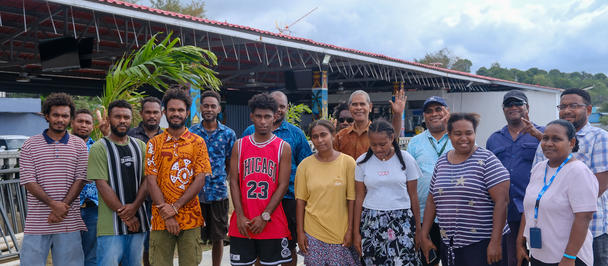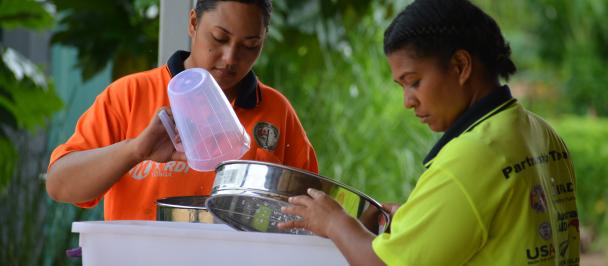Enabling resilient and accelerated recovery
October 26, 2022

Akata Taito, Inclusive Insurance Solutions Hub Coordinator for the joint UNCDF-UNDP Pacific Insurance and Climate Adaptation Programme (PICAP) speaking at the 2022 Asia-Pacific Ministerial Conference on Disaster Risk Reduction in Brisbane, Australia last month.
What are the elements of strong disaster risk reduction and management strategies that enable quick, equitable and resilient recovery?
This was the central question during an expert panel discussion on ‘Enabling Resilient and Accelerated Recovery’ at the 2022 Asia-Pacific Ministerial Conference on Disaster Risk Reduction that concluded in Brisbane on September 20.
The panelists include Akata Taito - Inclusive Insurance Solutions Hub Coordinator, the UN Capital Development Fund’s (UNCDF) Pacific Insurance and Climate Adaptation Programme (PICAP), Tangimeimoana Kiao – Deputy Director, National Emergency Management Office of Tonga and Cedric Daep – part-time Professor at Bicol University Graduate School in the Philippines.
The question is most pertinent for Pacific Island Countries (PICs) that are routinely exposed to climate disasters at great costs to development prospects.
Between 2011 and 2020, 91 major natural disasters have struck the region, impacting more than five million people.
Moreover, the 2021 World Risk Index has six PICs among the top 20 most at-risk nations to natural disasters in the world, with Vanuatu, Solomon Islands and Tonga occupying the top three positions respectively.
The panel sought to unpack the question by combining unique regional experiences and knowledge from Asia and the Pacific to propose potential solutions.
While there are multiple answers, the focus was on the role of the community in disaster preparedness, response, and recovery.
They agreed that urgent, innovative solutions and strategies were needed to stave off the worst impacts of climate disasters in regions more prone to them, such as the Pacific Islands.
When thinking about disaster risk management strategies, the needs of the most vulnerable need to be the central focus, the panelists said.
This is where Ms. Taito said community involvement in the design of disaster risk reduction solutions and strategies is critical for resilience-building, preparedness, and recovery.
She highlighted UNCDF’s work under PICAP in catalysing the private sector to make climate risk insurance accessible to low-income groups, such as smallholder farmers, fishers, MSMEs and social welfare recipients in Fiji.
The Programme has introduced the Pacific’s first parametric micro-insurance product in Fiji that provides coverage against high wind and heavy rainfall related risks, with maximum payouts of up to $2,000 at a premium of 10 percent per annum. The products will soon be launched in Vanuatu and Tonga, followed by Solomon Islands and Samoa in 2023.
Parametric products are unique in that no damage assessments are required for the payments to be processed.
The funds are automatically sent to the policyholder once a pre-defined trigger, such as a minimum amount of rainfall or the strength of a cyclone, is met or exceeded.
Ms. Taito said community groups, such as farmer associations and cooperatives, were heavily involved in the design and testing of the product “in a nice market-based ecosystem” convened by UNCDF that includes private insurers, government and mobile network operators.
This ‘ecosystem’ also includes women’s and disability rights groups to ensure gender and social inclusion in all programme activities.
The idea, she said, was to help communities better understand the solution being designed for their protection so they are in a stronger position to use them effectively and sustainably.
At the same time, these groups provide valuable feedback that makes product design, marketing, and distribution more precise and targeted to their needs.
FinTech firms are also part of the ecosystem partnership to enable digital signups for the insurance scheme and for payments to be processed through mobile money wallets, thereby allowing affordability and greater accessibility by community groups, Ms. Taito said.
“Every actor has a role to play – the government, private sector and most importantly our communities. People must be at the heart of climate financing and insurance product design process,” Ms Taito added.
“Whilst PICAP provides technical support to design private sector-led solutions, we always find that it is important to integrate awareness component into the overall implementation plan to ensure the public are making well informed decisions. Creating awareness around preparedness and disaster risk management is particularly important within vulnerable communities who are disproportionately affected following a climate event.”
Tonga’s Ms. Kia said understanding and tapping into the strengths of communities to complement development initiatives was critical part of this approach.
The country’s sizeable and close-knit diaspora community provided cash and kind support to aid tsunami recovery efforts in the aftermath of the Hunga Tonga-Hunga Ha’apai undersea volcanic eruption.
Another strong support system in the majority Christian nation are the churches and associated community groups, which Ms. Kia said should be part of conversations on disaster risk reduction strategies.
“Every recipient community has a contribution to make in disaster recovery,” she added.
With so many stakeholders on the table, coordinating activities could become a challenge.
This is where Mr. Daep of the Philippines said good leadership and communication was required, in addition to well-defined roles for each stakeholder, for recovery efforts to go smoothly and have the maximum impact.
“Applying the principle of teamwork and the principle of being institutional and solutions oriented is critical,” he said.
These discussions have established the community as an important stakeholder in disaster recovery efforts, and not a footnote as it tends to be at times.
The Programme is jointly implemented by UNCDF, the UN Development Programme and the UN University Institute for Environment and Human Security and is supported by the Governments of New Zealand, Australia, and Luxembourg.

 Locations
Locations



